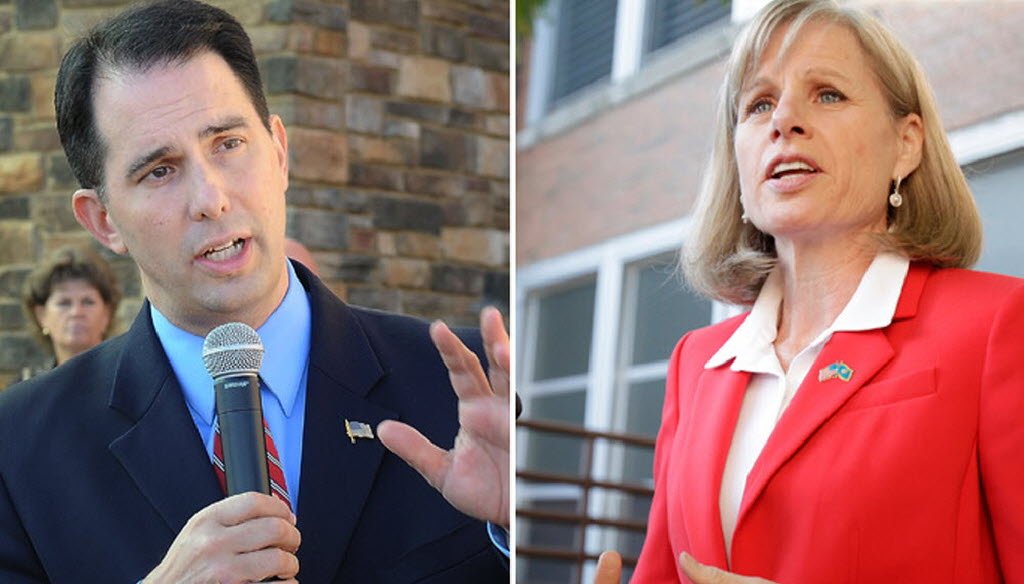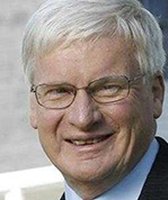Stand up for the facts!
Our only agenda is to publish the truth so you can be an informed participant in democracy.
We need your help.
I would like to contribute

We're tracking Scott Walker and Mary Burke as the promises start to fly in the governor's race
It’s never too early -- or late -- to make a potentially game-changing campaign promise.
In his career-boosting triumph in the 2002 Milwaukee County executive’s race, Scott Walker’s talk of a property-tax freeze caught opponent Jim Ryan off guard just weeks before a special election.
Today, Governor Walker’s already making bold statements about slashing income taxes for everyone if he were to run a national race and then win the presidency in 2016.
Walker, of course, has some fish to fry back home first -- his re-election bid in the fall of 2014.
When he won election in 2010, the Wauwatosa Republican made more than 60 promises that we are tracking on the Walk-O-Meter. And he’s made some notable promises as part of the 2014 race.
Meanwhile, a Democratic challenger, former Trek Bicycle executive Mary Burke, has made dozens of promises on the campaign trail after earlier pledging to avoid specific pledges.
Today we take an early look at key promises made by the two -- and invite readers to send us additional ones as the 2014 governor’s race unfolds. ([email protected], or tweet us at @PolitiFactWisc).
What’s in it for you? Your discovery just might show up on our 2015 gubernatorial promise meter.
If Walker returns for a second term, we’ll restock the Walk-O-Meter. If Burke prevails in November, we’ll create a Burke-O-Meter.
Now to the highlights of our early promise search.
Taxing Times
One of Walker’s top issues -- tax relief -- is at the heart of a promise he made in February 2014: keeping property taxes for the typical homeowner in the state at or below their current level through 2018.
Walker frequently says a "typical" homeowner with a median-valued home will have a smaller tax bill at the end of 2014 than the homeowner did in 2010, thanks to tax controls he and fellow Republicans put in place. We rated that Mostly True, with the caveat that it’s an illustration based on a statewide average, not a real-world example.
Looking ahead, Walker also has floated the possibility of eliminating or flattening the income tax as part of a 2015-’17 budget proposal if re-elected. He’s stopped short of a promise on that so far.
What about Burke?
The Madison school board member says she will "hold the line" on taxes while maintaining "an adequate state and local tax base to continue providing needed government services."
She hasn’t proposed cuts in major taxes. Burke says she’s counting on a rise in incomes over time to "lower the share of income paid in taxes and fees."
School issues
Burke has promised several moves she says will trim higher-education costs:
-
Making student loan payments deductible from state taxes, "just as you can currently deduct college expenses."
-
Raising the college tuition deduction on state income taxes from $6,943 to $10,424, and expanding it to families making up to $150,000.
-
Working to increase state funding for higher education, including for student financial aid, by an unspecified amount. She has criticized Walker for cutting college funding.
Walker signed a two-year tuition freeze in June 2013.
On kindergarten-12th grade schools, Burke has said she would eliminate the new statewide expansion of the school voucher program as well as the private school tax deduction enacted by Walker and Republicans, calling them "entitlement programs" the state can’t afford.
The statewide expansion of vouchers, approved in 2013, allows 500 students across the state to use taxpayer funding to attend private or religious schools this school year.
Burke, though, has made clear she would not work to end the voucher program in Milwaukee and Racine, where it is long-established.
Jobs and pay
Burke says that as governor she will support phasing in a minimum wage of $10.10 in three stages over two years "to help working families make ends meet, reduce dependence on government assistance and to spur
demand that grows our local economy." The state’s current minimum wage is $7.25.
Walker has said he will oppose raising the minimum wage, calling it a job killer. The governor says the increase is backed by people who are "raising a white flag" by concentrating on low-wage jobs instead of creating better-paying ones.
Burke says she would reinstate Wisconsin’s 2009 Equal Pay Enforcement Act, which granted a right to sue employers in state court for compensatory and punitive damages. Walker signed the repeal of the act in 2012.
Burke, a former state Commerce Department chief, has pledged dozens of state actions to boost job creation.
She’s promised to expand "angel" investor tax credits, set up a program to prod lenders to help new small businesses, increase funding for venture capital investments, and establish a Wisconsin Innovation Fund. She would launch a Wisconsin Export Fund and expand the state’s overseas marketing.
Burke has pledged to allow the University of Wisconsin to
participate in classified government research. She says she would veto any legislation banning stem cell research.
Burke says her aim is to "increase the average wage for Wisconsin
workers" and work toward the longer-term goal of exceeding the national average.
On employment, she says her goal is for "job creation to outpace the nation until our workers catch up, and then set our sights
on becoming a thriving Top 10 economy in terms of job growth."
Many of Burke’s promises appear in her "Invest for Success" plan released in March 2014.
Gay marriage
Burke says as governor she would work to defend the state’s domestic partnership registry. Walker believes the registry law giving gay couples hospital visitation rights violates the state constitution’s ban on gay marriage and civil unions. He stopped defending the law, which is the subject of a pending Wisconsin Supreme Court case.
Burke says she would sign legislation allowing gay marriage. For that to happen, voters first would have to approve it in a referendum.
Unions and collective bargaining
In March 2011 Walker and GOP lawmakers passed a law, which became Act 10, that repealed most collective bargaining for most public employees. Burke has criticized Act 10, saying it divided Wisconsin and left it weakened.
Burke repeatedly has pledged to work to try to "restore" collective bargaining, though she has not specified whether she means a complete return to the pre-Act 10 reality. Burke has said getting workers to pay more for their health care and pensions was fine, but she said she she would have negotiated with workers to get that. Act 10 mandated that cost sharing or allowed government leaders to impose it.
As governor, Burke said, she would make sure that unions regain the ability to deduct union dues from state workers’ paychecks. And she would drop Walker’s more stringent rules on union certification.
Federal Medicaid expansion
Burke promises to overturn Walker’s refusal to accept the expansion, which was part of the federal Affordable Care Act.
Abortion
Burke pledged to work to repeal a law signed by Walker in July 2013 that requires women to undergo an ultrasound in order to get an abortion.
Our Sources
PolitiFact Wisconsin and Milwaukee Journal Sentinel archives
Burke for Governor, "Mary Burke’s Plan: Invest for Success," March 25, 2014
Burke and Walker campaign websites











































